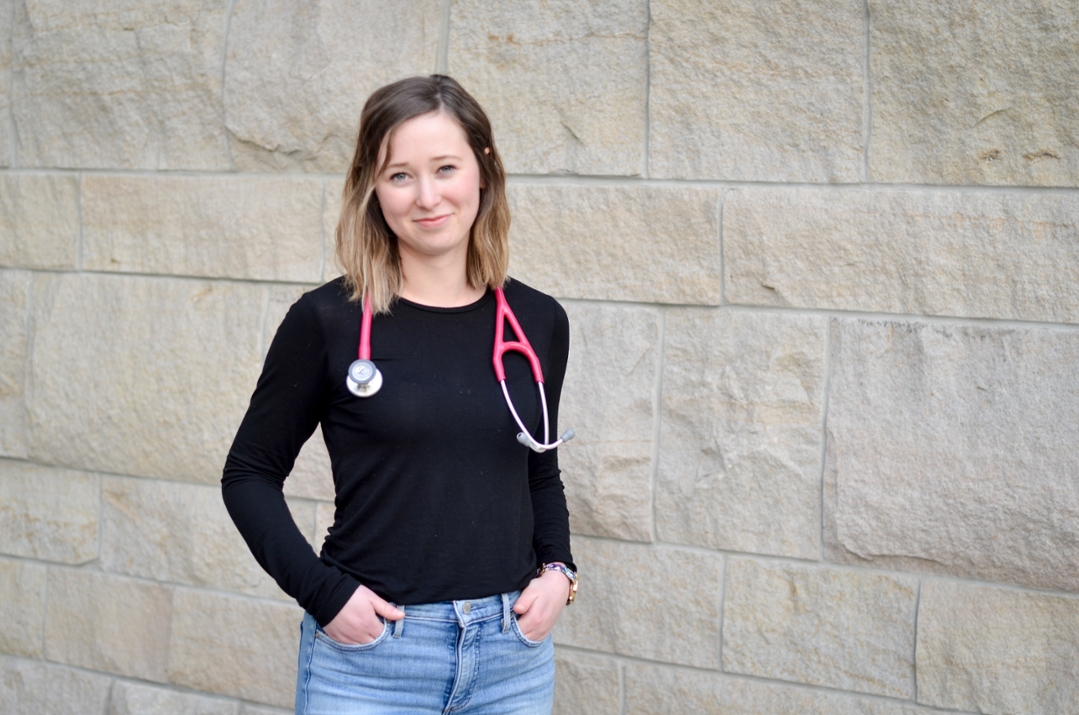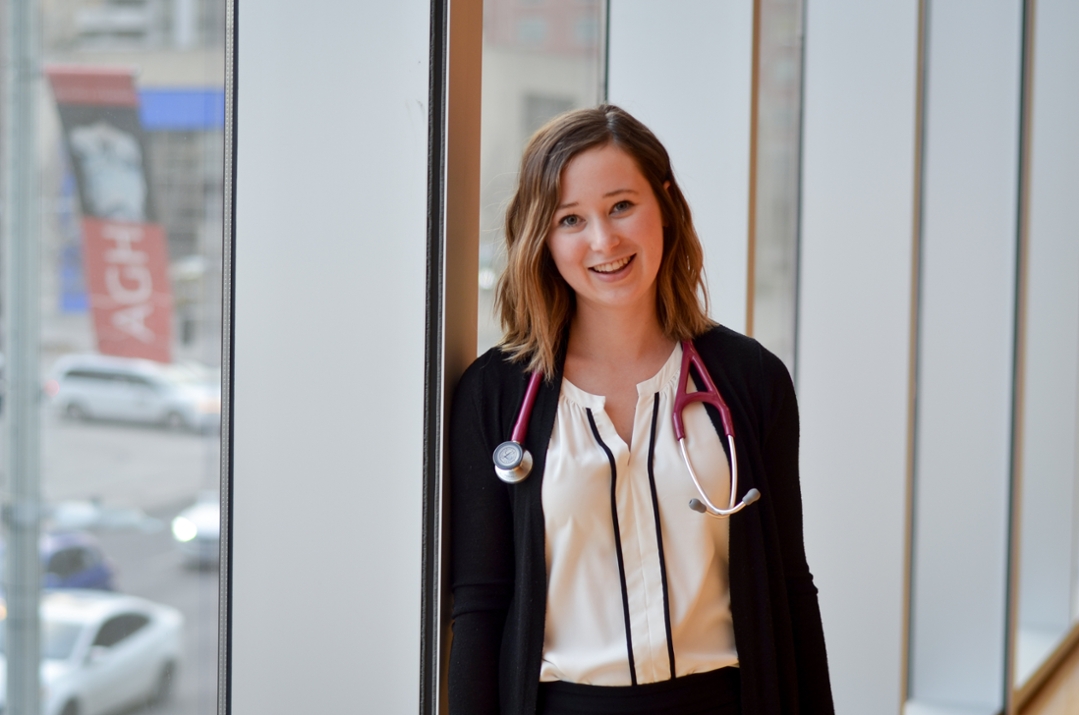
The good doctor
Improving end-of-life care for people experiencing homelessness
By Greg BaskyIt was a patient she encountered early on in her fourth year of medical school that reinforced for Dr. Jacqueline Carverhill (MD’19) the importance of providing good care to everyone, regardless of social status.
“During a palliative care elective, I sat at the bedside of a Congolese refugee who was forcibly separated from his family, now homeless in Canada and dying of advanced prostate cancer,” she recalls in a written email. “He had lost all of his belongings, including his cell phone, when he had been admitted to the palliative care unit in a state of delirium and so could not communicate with anyone outside of the four walls of his hospital room.”*
As the only member of the care team who spoke French, she translated for him.
“But mostly, I listened,” says Carverhill, who is seven months into a two-year residency in family medicine at McMaster University in Hamilton. “As with countless other clinical interactions, it reminded me that in order to truly honour my patients’ vulnerability, I need to combine my clinical passions with broader advocacy that champions health equity as the ultimate goal.”
Carverhill’s commitment to looking out for those less fortunate started early. She grew up in a family that was “very social justice oriented,” says Carverhill. Her parents had her set aside Halloween candy she’d collected trick or treating, to share with sick children staying at Ronald McDonald House.
Carverhill can remember being about six, and rather than spending the money she’d socked away to buy herself a Beanie Baby, she contributed it to a hamper at Christmas so another child would have a toy under the tree. “I am sure that the values my parents raised me with have influenced the kind of medicine I want to practice,” says Carverhill, who last year was named Student Leader of the Year by the Saskatchewan Medical Association.
On her radar
Palliative care, which focuses on improving quality of life and reducing suffering for people with life-threatening medical conditions, appeared on Jacqueline’s radar in first year of medical school, when she had the opportunity to shadow other physicians. She liked that it involved working with families, and focused on what the patient wanted and figuring out how to make that happen.
“Sometimes that involves thinking really creatively, or outside of the box, to provide the care that’s most patient centred.”
Carverhill’s introduction to what has subsequently become her North Star -- providing palliative care to people experiencing homelessness -- came in spring 2016, when as an organizer for the College of Medicine’s Health Innovation and Public Policy Conference, she helped land guest speaker Dr. Naheed Dosani, the founder of PEACH (Palliative Education And Care for the Homeless) an inner city, mobile palliative care clinic in downtown Toronto.
Many people without stable housing lack consistent access to care -- including palliative care. And because they don’t have a regular family doctor, they frequent the Emergency Room often. “I had never really thought of that before, in terms of that specific niche area.” After meeting Dosani and hearing him speak, Carverhill initiated a mentorship that continues to this day.
Carverhill was so struck by PEACH’s innovative approach that she travelled to Toronto after her second year of medical school, to see the program first-hand.
Then, in fourth year, she arranged her electives so she could actually work with Dr. Dosani and the PEACH team -- and in similar programs across the country. The time she spent working with inner city mobile palliative teams in Edmonton and Calgary sealed the deal.
“It was really those weeks that I spent doing this work where I just loved every minute of it. That’s when I knew that that’s exactly what I wanted to do. I think there’s a huge need to provide this kind of care.”
Building the will and securing funding to launch an outside-of-the-box care program will require more than just passion.

A Future 40 award recipient
Fortunately Carverhill -- named a Future 40 award recipient by CBC Saskatchewan in 2017 -- has honed her political chops through a variety of extracurricular activities during medical school. As the elected government affairs and advocacy representative for her medical student union, she’s participated in lobbying activities aimed at influencing public policy around the social determinants of health -- those factors with a far greater impact on a person’s health status than medical care, such as education, housing, and employment.
She also helped get Saskatchewan Students for Medicare rolling. And she’s been part of federal and provincial lobby days organized annually by the Canadian Federation of Medical Students, to bring attention to issues such as a national pharmacare program, the opioid crisis and Indigenous mental health. The year after Carverhill and fellow medical students advocated for universal coverage of antiretroviral medication for people who are HIV positive, the Saskatchewan government began paying for the drugs.
These experiences may come in handy when it comes time to approach decision makers to change policy or allocate dollars, says Dr. Dennis Kendel, a senior health-care leader Carverhill counts as another of her mentors.
“Jacqueline does seem to have stronger skills in this area than other students would. She has a good sense of how you approach people in a way that’s not threatening and that helps them understand the aspiration you have,” says Kendel, who was most recently interim CEO of Saskatchewan’s Health Quality Council.
Future initiatives
Carverhill feels all the training experiences she’s had and projects she’s been involved with since starting medical school have built on each other. After she wraps up resident training at McMaster University, Dr. Carverhill plans to do a fellowship in palliative care. Then it’s time to get to work on fulfilling her big dream: To create a mobile palliative care clinic back home.
“I have a lot of ideas for how I might be able to take pieces of all these models (from mobile clinics in Toronto, Victoria, Calgary, and Edmonton) and one day bring them back to Saskatoon, to create a similar program that works for our community.”
While research shows many medical students finish their training with less compassion that when they started, Dosani sees the opposite in Jacqueline.
“Her drive is so strong and focused on this niche -- but very important -- issue. That perseverance speaks volumes about who she is.”
Carverhilll, says Dosani, is driven by compassion to improve care for people who are often underserved by the health system.
“She is not OK with the status quo because it’s not working for a significant proportion of Canadians.”
Kendel too sees big things in Carverhill’s future. He describes her as a “trailblazer” who will continually challenge society to do a better job meeting the needs of people living on the margins, now poorly served in our conventional health care system.
“Many homeless people die prematurely because of impaired access to life-sustaining care. Jacqueline is passionate about trying to change that.”
For Carverhill, it just boils to meeting patients where they’re at.
“For some, that means on the street corner, in a shelter, where they may feel more comfortable than in a medical clinic or in a hospital.”
She says creating a mobile palliative care program in Saskatchewan will bring awareness to the community and the health system that unmet needs exist and the importance of agencies working together to fill in the gaps.
“Ultimately it’s about providing dignified care to individuals. I think everyone deserves that.”
*This story has been updated on Aug. 24, 2020


